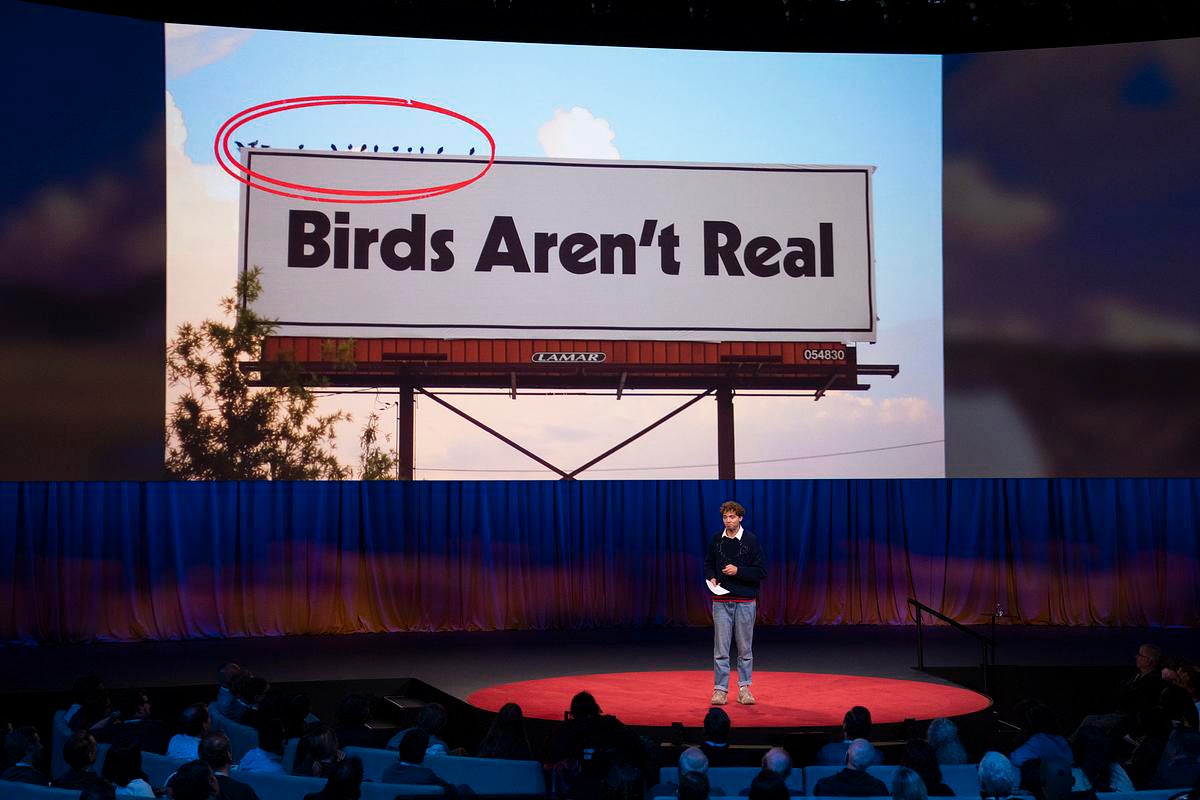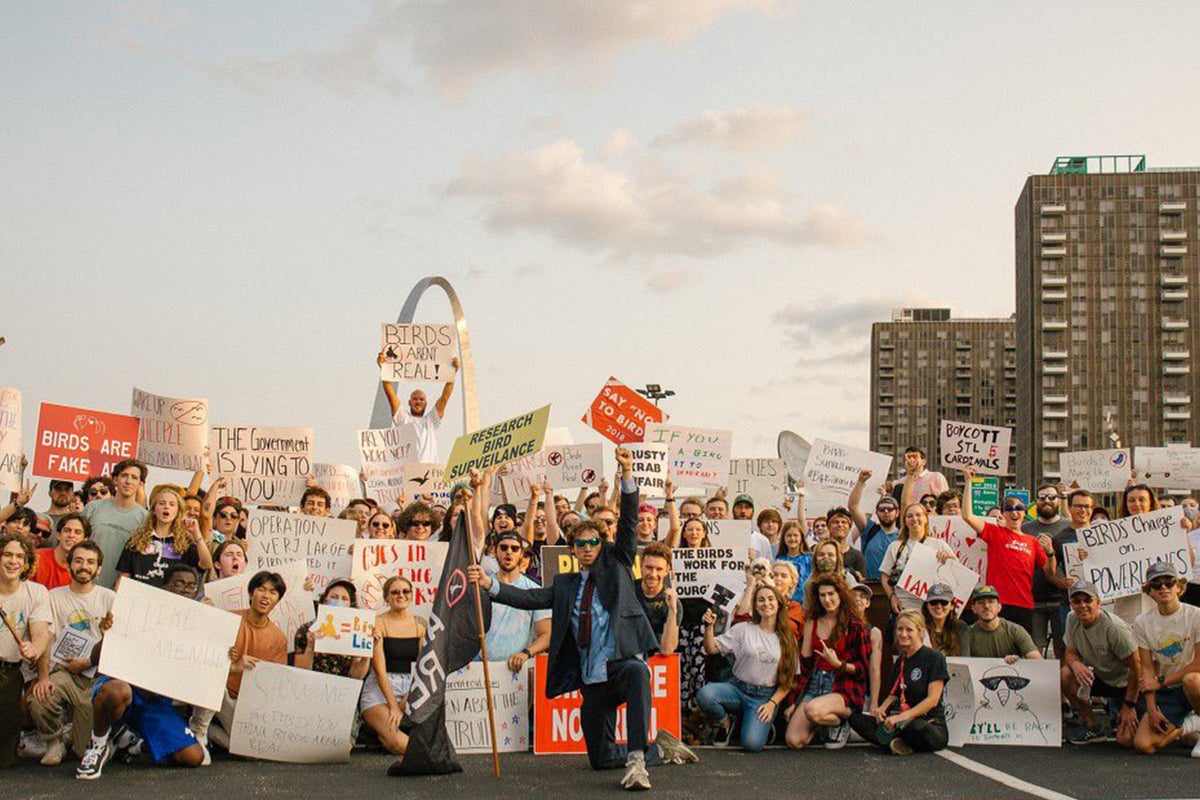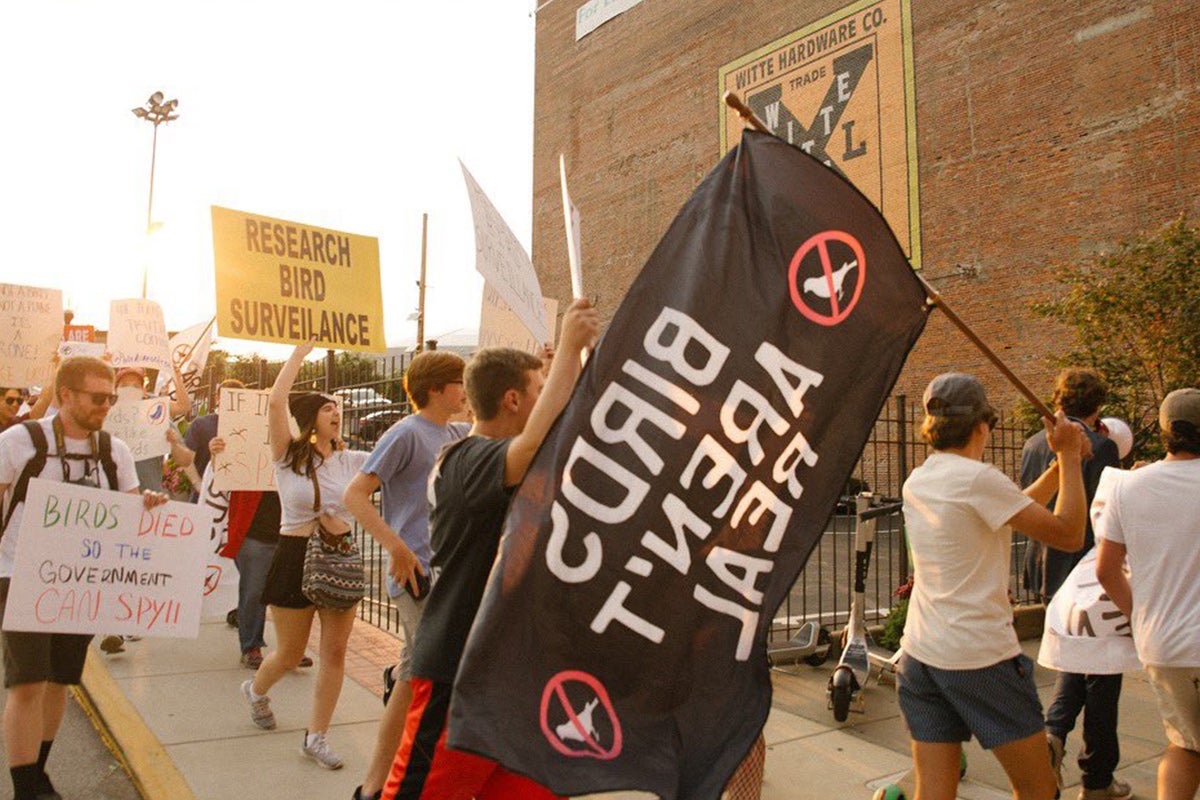The Kid Behind America’s Most Bizarre Conspiracy Theory Just Found the Perfect Second Act
Peter McIndoe spent the first several years of his 20s traveling across the country, being insulted by strangers. In retrospect, it was fieldwork.
Between 2018 and 2021, McIndoe, now 25, went from state to state, playacting the role of radicalized cult leader pushing an absurd conspiracy theory—that, as he put it, “birds aren’t real.” Avian creatures, McIndoe warned, were being systematically massacred and replaced by deep state–operated drones, designed for widespread surveillance of the populace.
The conceit was satire: a metacommentary on the countless eccentric and convoluted conspiracy theories that were ripping through the country in the aftermath of Trump’s election and the dawn of the QAnon age. But for years McIndoe played it straight, declining to publicly acknowledge the humor or performance art behind the “movement.” Soon, his campaign had attracted thousands of Gen Z “followers” who were delighted to be in on the joke. These fellow “bird truthers” founded their own autonomous local Birds Aren’t Real chapters, posting flyers and holding rallies in their own communities. (McIndoe eventually outed himself as a method actor in December 2021, on the front page of the New York Times.)
The obvious bunk-ness of the idea that birds are being replaced en masse by feathered espionage technology didn’t stop many, many people—even members of the media—from taking the act at face value. Several news stations reported that Birds Aren’t Real was a bona fide conspiracy theory that had been circulating among genuine believers for decades. And some people McIndoe encountered on the road were so rude, or downright hostile, in their attempts to help him understand that birds are in fact real that McIndoe found himself beginning to sympathize with the tinfoil-hat-wearing conspiracy theorists he had set out to parody.
McIndoe’s commitment as a performer ended up giving him a unique view into the minds and experiences of many Americans. It’s that surprising, empathy-fueled understanding of the modern conspiracy theorist that has inspired his next project: political action.
The secret to McIndoe’s success might be that it’s almost impossible to tell when he’s acting. At least for the uninitiated. And he relishes the opportunity to slip back into his role as a conspiracy theorist whenever he gets the chance. This June, Macmillan will publish his book about the movement, written entirely in character with his collaborator and friend Connor Gaydos, entitled: Birds Aren’t Real: The True Story of Mass Avian Murder and the Largest Surveillance Campaign in US History. On the TED stage last April, when he gave a talk at a five-day thought leadership event, McIndoe performed as the conspiracy theorist alter ego for a full five minutes before letting audience members—many laughing uncomfortably or visibly alarmed—in on the shtick. In September, Fox producers took his claims at face value, both on Jesse Watters Primetime and in a streaming, 25-minute Fox Nation documentary.


Courtesy of TED
To back up a bit: Shortly after the inauguration of President Trump, McIndoe, then 19, was attending a women’s rights march when he scrawled “Birds aren’t real” on the back of a poster. It was just an off-the-cuff absurdism, a phrase that had popped into his head. He never expected the idea to go viral, but viral it went: first with high school students across Memphis, who were writing the phrase on classroom chalkboards within days of the protest, then with hundreds of thousands of young people across the U.S. on social media.
McIndoe leaned into it. Soon, he was selling “Birds Aren’t Real” T-shirts and, within months, dropped out of college in his home state of Arkansas and moved to Memphis to “follow the energy” of the movement he’d “accidentally” launched.
By 2020, McIndoe and team had erected multiple billboards in cities including Birmingham and Los Angeles. McIndoe bought a “conspiracy van,” which allowed him to more easily tour the country in character, espousing his “belief” that, since 1959, the U.S. government had been committing mass avicide and replacing live birds with drones designed to surveil the American people.
Some days, McIndoe would roam the streets, handing out flyers that said things like “If it flies it spies” and “Birdwatching goes both ways.” Other days, he would simply pull into a new city, park in a public space with his van—“WAKE UP, BIRDS AREN’T REAL” plastered across the side—and wait for people to approach. And they did, looking him right in the eye and telling him that he was unhinged, uneducated, stupid, idiotic, and wrong.
Of the hundreds, maybe thousands, of these encounters, one—in Branson, Missouri—stands out. A man disagreed with McIndoe, and his approach was to yell. “This guy walked up to me and started not just calling me crazy or stupid, but started saying, ‘You’re schizophrenic. You need help,’ ” McIndoe told Slate. This guy’s anger—and his approach—really crystallized the dire state of cross-party relations in a fractured America. “If we’re to a point where you’re not even having empathy for someone that you think is schizophrenic, then we’re at a really bad point,” he said.
McIndoe grew up near Little Rock, Arkansas, and was home-schooled, closed off from mainstream culture, he said, without access to “normal media” and surrounded by “hyperconservative” Christian ideals. When, around age 10, he questioned the logic behind the Bible stories he was being taught, he was treated as though he had been “possessed by a demon,” he recalled. Channeling the characters he remembered from childhood, acting the part of Birds Aren’t Real true believer, came naturally.
But when people—like the guy in Branson—told him he was “the problem with this country,” he didn’t feel like someone who was in control, someone who was playing the audience. He felt sad, judged, and dismissed—even emboldened to double down. On the outside, he’d be reasoning with naysayers about all the evidence that pigeons, crows, and starlings were the pawns of government agents. Inside, he recalled, he was thinking: My God, could these people be any more ineffective? His argument was absurd. And yet, the people arguing with him, the people with whom he actually agreed, were not winning.
After his time embedded in radical America, McIndoe has become an evangelist for “trying to reduce loneliness, [on] whatever scale we can.” His target audience is basically the left, and the TED audience that he spoke to last spring was a tactical place to try that out: “If our goal is to live in a shared reality with our neighbors,” he said, we need fewer people disappearing into echo chambers where dangerous ideas proliferate, often in ways that are incomprehensible to outsiders. “Let’s direct our energy toward the crisis of belonging,” including people in our communities instead of condemning them, he said. “Maybe then we can understand the crisis of belief.”
Take how McIndoe says he eventually swayed his own father on the issue of corporate evil. His initial instinct was to share Bernie Sanders talking points. Instead, in their conversations together, he kept dropping references to the Book of Mark. “Bringing up the Scripture and getting on his level changed his mind,” McIndoe said. “It was about ‘How can I unkink the hose of this conversation and create a bridge in a common language?’ ”


Courtesy of Birds Aren’t Real
In such a polarized nation, having been trained in that “common language” is a rare thing. But McIndoe thinks his personal experience—during his childhood and while on the road—might show others the value in learning it.
Though McIndoe speaks to the left, this isn’t just about left vs. right. The split between who got the joke about Birds Aren’t Real wasn’t ever about political affiliation. Mostly, McIndoe sees a “massive generational divide” in how people react to the bit.
“I think for people who didn’t grow up with the internet, they see and they assume that it is real,” McIndoe said of the Birds Aren’t Real movement. “Anyone from Gen Z sees the idea and, pretty much immediately, assumes it’s a joke.”
There’s a sardonic sensibility there that is worth mining. Next year will see between 7 million and 9 million potential new Gen Z voters, compared with 2020. This November, the 2024 presidential election, almost half the electorate will be under the age of 45, according to data from the Brookings Institution.
And McIndoe has seen firsthand the potential for activism among his cohort. Across the U.S., 19-year-olds McIndoe had never met slid into his DMs to ask permission to launch chapters of Birds Aren’t Real in their own cities and states, sporting the merch, launching their own social channels, and handing out flyers at their local farmers markets. Thousands have turned up for massive rallies, including in Washington Square Park, where protesters booed pigeons that flew overhead. At a demonstration beneath the Gateway Arch, McIndoe put down his megaphone to symbolically set fire to a St. Louis Cardinals flag (because of the cardinal) as the crowd cheered. In November 2021, hundreds of “bird truthers” encircled the then-Twitter headquarters (in protest of its bird logo), marching around the structure three times as if it were Jericho, “in an attempt to get the building to crumble down,” McIndoe said. (One has to wonder: Did they succeed? In July, when Elon Musk rebranded Twitter as X, he posted, to the newly deplumed platform, “I knew birds weren’t real.”)
“We made it local and tangible,” McIndoe said, “and we created systems where people could feel like it was their own.”
Now the question is: If young people will turn up in such massive numbers with such unflagging energy for a fake cause, can McIndoe help turn them out for a real one?
McIndoe and his friend Adam Faze, who produces shows for TikTok and recently raised a $750,000 seed round for his new content production company, are attempting to harness this type of enthusiasm with a political network they’ve called Fifty Stars.
“The right has a very strong engine ecosystem that is communicating with Gen Z, from the Daily Wire, to [MAGA YouTubers] the NELK Boys, to the Joe ‘Roganverse,’ to the Jordan Petersons and the Andrew Tates,” McIndoe said. Not Fox News commentators but comedians, fitness influencers, and lowly podcasters are “influencing the future of the right more than anyone,” he said. “The left doesn’t have anything comparable.”
What Fifty Stars will be is a little bit nebulous—perhaps a consultancy, perhaps a digital media channel for TikTok shows like the ones Faze produces. It will certainly be some kind of organizing tool; “Birds Aren’t Real” has already become that. Last March, along with Faze collaborator Ari Cagan, the young men pushed their followers to “take over” Truth Social, Trump’s social media network, rallying thousands of TikTok followers to get the hashtag #Desantis2024 trending in order to taunt the former president close to the time of his arrest in New York.


Courtesy of Birds Aren’t Real
“Birds Aren’t Real” activists have been known to flash-mob anti-abortion rallies and other right-wing demonstrations; often, they show up not to counterprotest but to delegitimize actual political radicals by marching alongside them.
And last year, Fifty Stars worked with Chi Ossé, a 26-year-old council member representing parts of Brooklyn, to amplify the impact of Ossé’s work to minimize rent increases in his district.
“I basically just kind of, you know, made sure he had a megaphone, made sure people were equipped with signs for a pop-up rally, making sure we have people RSVP and we’re following up with a newsletter—just, like, really organizing something,” McIndoe said. It had a real effect. The usual constituent turnout is almost none, according to an official familiar with these types of meetings. But after hearing about it largely via Instagram and TikTok, nearly 1,000 people turned up for the Rent Guidelines Board meeting, Ossé reported via his social media at the time.
“The line just wrapped around the block—around multiple blocks—of people waiting to enter; the building’s spilling out with people, with every seat taken up by people with signs,” McIndoe recalled.
Before the meeting, the board had proposed increases of as much as 16 percent. After the resounding show of dissent, the number ultimately landed at 3 percent.
In other words, McIndoe’s tactics can help politicians get results. “I think a lot of my generation feels disaffected,” McIndoe said, and campaigns and movements full of “amorphous messaging” in which young people always seem to be “giving to something that never gives anything back” don’t help. 2024 has been called “a Groundhog Day for disillusioned young voters,” but the next presidential election could hinge on the turnout of young people—and Birds Aren’t Real could be a case study in getting them involved. “I’m so excited about and hopeful about the future,” McIndoe said. “I can apply more of these ideas to things in the real, public sphere.”


